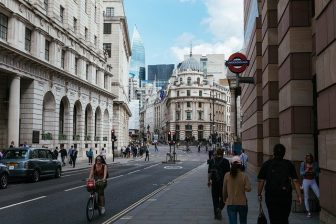 The Bank of England has increased interest rates for the first time in more than three years in an attempt to tackle strong inflationary pressures building up in the economy.
The Bank of England has increased interest rates for the first time in more than three years in an attempt to tackle strong inflationary pressures building up in the economy.
The increase to 0.25% from 0.1% comes despite fears the Omicron variant could have an adverse impact on the economy. The rate hike followed data this week that showed prices climbing at the fastest pace for 10 years.
The Bank’s decision is set to increase the mortgage costs of some homeowners, with more than £15 added to the typical monthly repayment for a tracker mortgage customer.
A standard variable rate mortgage-holder is likely to pay an additional £10 a month.
Official figures show that almost two million people in the UK have one of these two types of mortgage.
Property industry reaction:
Vanessa Hale, head of insights and residential research at Strutt & Parker, commented: “This rate rise may not be significant but it is a clear statement of intent. The rise has been a long time coming, and with inflation now at decade high levels, there really is little alternative. The rate rise has been priced in to mortgages, and with fixed mortgages making up around 80% of the current market, the housing sector is unlikely to be impacted too dramatically. The reality is that demand for housing continues to outstrip supply which will sustain prices for 2022. However, with the cost of living continuing to rise, this could have an impact on the housing market for the medium term.”
Dominic Agace, chief executive of Winkworth, said: “An interest rate rise has been priced into the market in the costs of mortgages and buyers’ expectations since before the BoE’s last announcement, when it was a surprise to see them held. A small increase in interest rates, while still keeping at historic lows to tackle a headline inflation rate of five per cent, may well be more positive for confidence and the property market than rates continuing to be held at these record low levels.”
Cory Askew, head of sales at Chestertons, remarked: “We expect the Bank of England’s decision to increase the interest rate to 0.25% to have very limited impact on property buyers and existing homeowners. As the demand for property continues to outstrip supply, we predict the market to remain competitive with many house hunters keen to find a new home quickly. Further indicating that buyer demand remains strong, is the fact that we have seen no seasonal slowdown this year.”
Eleanor Bateman, Policy Officer at Propertymark, commented: “The increase in base rate to 0.25% is a small and necessary step and one that most had anticipated for some time.
“”Mortgage rates have been creeping up over the past few months, and while those on variable rates will see payments increase, the cost of borrowing remains low relative to historic levels.
“Though, traditionally, the winter months see a decline in activity, our Housing Market report shows sustained demand with average sales agreed maintained to the end of October.
“With indications that lifestyle factors are continuing to prompt many into making a move, we do not expect today’s announcement to have a significant, negative impact on the market.
“Continuing uncertainties over COVID-19 may, however, have more lasting effects, and we would urge the UK Government to consider the property industry’s significance in any forthcoming decisions on further tightening of pandemic-related measures.”
Lawrence Bowles, director of research at Savills, said: “The announcement that the Bank of England has made an incremental increase to UK interest rates that should come as no surprise, particularly in light of the International Monetary Fund’s warnings earlier this week.
“Our latest forecasts for the period 2022-2026 anticipated rate rises over the course of the coming year, and as such, we have estimated price growth in the near term to be somewhat more muted than we have seen of late.
“But, despite widespread expectations of an imminent rate rise, the latest RICS data show that sales activity is still running far higher than normal levels, even after moderating since the stamp duty holiday ended. In November, the sales to stock ratio was 46%, compared to the 2017-2019 average of 34%. This, combined with relatively low unemployment rates coming out of a recession, means we expect to see softer growth as opposed to something more dramatic.
“However, further gradual interest rate rises will cap how much new buyers can borrow relative to their income in a higher interest rate environment, particularly in higher-value markets where affordability is most constrained, acting as a drag on more long-term prospective price growth and market activity as we’ve anticipated in our forecasts published in November.”
Simon Gammon, managing partner of Knight Frank Finance, said: “By raising the base rate it’s clear that the Bank of England believes the economy will shrug off most of the effects of Omicron. Getting a grip on rising inflation appears to be the number one priority. Mortgage rates on the high street have been edging upwards during recent weeks in anticipation of this moment and it’s clear the lenders believe there could be at least one more hike in the base rate next year.”
Bruce Burkitt of Property Experts commented: “The rate rise announcement is no surprise, however, the timing is. I thought this would come in early in the new year if the current COVID spike increased over Christmas and business failed to pick up come January, so it shows how serious our current situation is becoming. That being said, this is still only a small incremental rise, so it’s impact won’t be felt too harshly.”


Comments are closed.